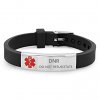Like
@Tipetoo, I have an Advanced Health Directive and relevant Powers of Attorney/Guardianship under my state's law and have done so since I was given a terminal/progressive disease diagnosis in 2009. Since an exacerbation of my condition last year and being put on oxygen, I was even more concerned about resuscitation attempts against my will. I spoke to the local hospital where I would be taken if a bystander calls an ambulance and they were unsure of the procedure would be, but suggested I speak to our ambulance service.
I did so and was advised along similar lines to
@LooperCat's advice above. Despite the introduction of an eHealth record by the Government, the ambulance service would not have access to that (seems pretty useless in that case, but typical of the shambles they made of the record's introduction imo). They would always check for a bracelet and after researching, I decided to go with MedicAlert - the bracelet has my unique member ID and a number to be called for details of my medical conditions, copy of my AHD, medications, etc. which I can update at any time. The reverse of the bracelet also has a summary with the AHD and DNR instruction specified. It's about the best that can be done in the current legal/health/technology environment. No 100% guarantee, but I've felt a lot safer from fruitless and invasive treatments in case of events outside my control.
I'd urge anyone saying they would want extreme measures in any medical intervention to really speak to medical professionals about it. Most don't want to go into a hospital at all 'in extremis' because they have first hand experience of what happens to people. The after-effects, especially in frail elderley, can be the stuff of nightmares. Was recently reading an account of what a young, previously hale and healthy individual went through to recover from just a short period of intubation, so can't imagine what it would be like for someone already ill, with co-morbidities, elderly, etc.


